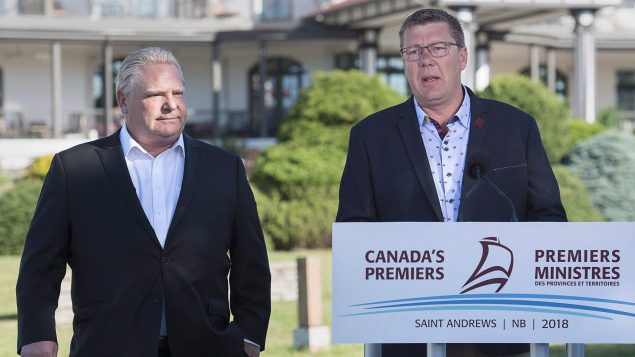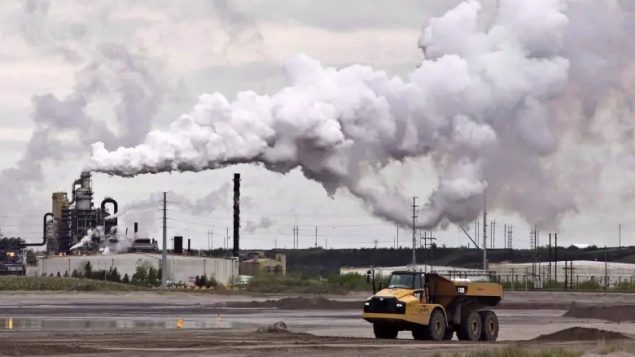With Saskatchewan and Ontario fighting a national carbon tax plan imposed by the Liberal government of Prime Minister Trudeau, new research suggests that a majority of Canadians believe that provinces should have the final say on how to reduce carbon emissions.
The Trudeau government’s federal carbon pricing plan is expected to come into effect next January, and it would apply to provinces that the federal government believes have not put in place adequate plans to cut carbon emissions.
But two-in-three Canadians (64 per cent) believe it should be the provinces that decide how to reduce emissions, not Ottawa, according to a new Angus Reid Institute poll, released Thursday.
The rest, (36 per cent) say the federal government should have the power to implement its own plan if necessary.

Ontario Premier Doug Ford, left, and Saskatchewan Premier Scott Moe talk with reporters as the Canadian premiers meet in St. Andrews, N.B. on Thursday, July 19, 2018. Ford and Moe have agreed to fight the federal government plan to impose a carbon tax. (Andrew Vaughan/THE CANADIAN PRESS)
The specific ways Saskatchewan Premier Scott Moe and his newly-elected Ontario Premier Doug Ford have gone about challenging the federal plan are perceived differently.
Seven-in-ten Canadians (72 per cent), including nearly 88 per cent of those in Saskatchewan say Moe is right to challenge the Trudeau plan in court, arguing that his province has its own plan in place.
By contrast, half of Canadians (51 per cent), and slightly over half of Ontarians (55 per cent) say that Ford’s recent decision to end Ontario’s cap and trade program was the right one.
The poll also shows that the overwhelming majority of past Conservative voters (82 per cent) say the provinces should maintain jurisdictional control of carbon pricing. Past Liberal and New Democratic Party (NDP) voters are evenly divided on the issues.
Less than half of Canadians (45 per cent) support the federal carbon tax plan. This is relatively unchanged from last year (44 per cent) but represents a significant drop from 56 per cent support for the idea in 2015, when the Liberal government swept to power.
Just over half of Canadians (56 per cent) say global warming is real, and primarily caused by human industrial activity. One-in-five (20 per cent) say it is real but caused by natural processes. The rest are split between uncertainty (11 per cent) or outright disagreement (14 per cent), the poll shows.







For reasons beyond our control, and for an undetermined period of time, our comment section is now closed. However, our social networks remain open to your contributions.